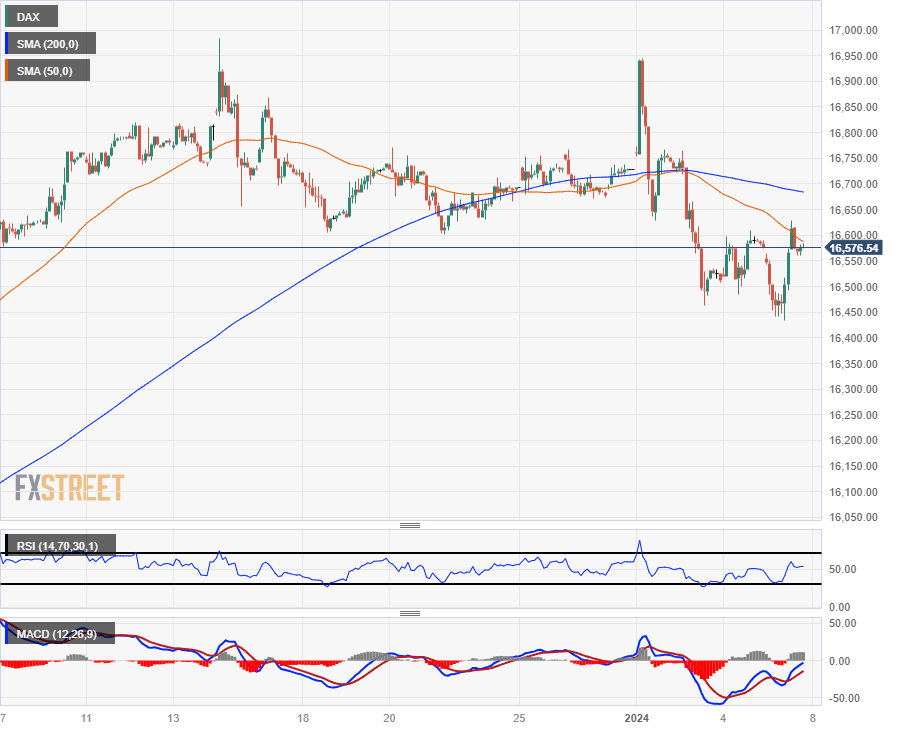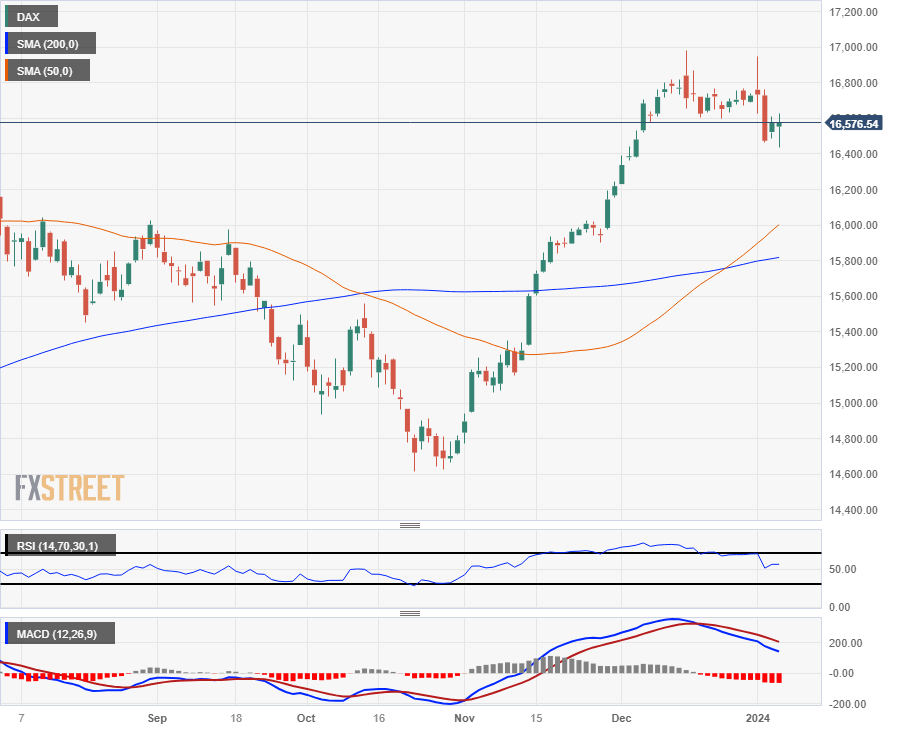- European stock indices closed lower on Friday after the rebound in inflation in the EU.
- The end of energy subsidies in the EU bodes poorly for the ECB's rate cut expectations.
- Likewise, US employment data reaffirms the US economic backdrop, reducing the likelihood of Fed cuts.
European stock indices lost weight on Friday, following a rebound in Eurozone inflation figures, while US Non-Farm Payrolls (NFP) solidly beat forecasts, adding the largest number of jobs since October, while markets expected a slight decline in the employment figure.
The European Harmonized Consumer Price Index (HICP) rose to 2.9% in December, slightly below the market forecast of 3.0%, but a good rebound from 2.4% in the previous period. The annualized core HICP fell to 3.4% in December, slightly below the 3.6% year-on-year in November and below the forecast of 3.5%, highlighting that much of the eurozone inflation is due to the rise in energy prices. EU subsidies aimed at limiting Energy Volatility are coming to an end, and the added increase in prices will affect EU inflation in the future, making it more difficult for the European Central Bank (ECB) to cut subsidies. interest rates.
European stocks fell to short-term lows after headline EU inflation rose, sending Germany's DAX index to a four-week low of 16,434 euros. European indices recovered from the collapse in inflation early on Friday before being dragged down again by the US NFP numbers, which came in well above expectations.
Friday's NFP data showed the U.S. added 216,000 net jobs to the U.S. labor picture, easily beating the market's median forecast of 170,000, and beating November's revised figure of 173,000 (revised down from 199,000). ). Investors will also note that the NFP data for October underwent further revisions and was reduced to 105,000 from the previous 150,000.)
The German DAX closed the week at 16,594.21 euros, with a drop of just over 23 points, to end Friday with a decrease of 0.14%, while the French CAC 40 fell almost 30 points, to close with a decrease of 0.4%, at 7,420.69 euros. The pan-European STOXX600 fell 1.3 points to end at 476.38 euros, around a quarter of a point lower. The FTSE London index also lost four tenths and closed with a decrease of 33.46 points, at 7,689.61 pounds.
DAX Technical Outlook
Germany's DAX 40 index of leading shares fell on Friday, and efforts by equity traders to bolster stocks back from the day's lows saw a late break back below the €16,600 level heading towards the bell. Friday closing.
The DAX entered 2024 with an early recovery to €16,950, as investors keep their eyes on the €17,000 area, but the equity index continues to be dragged below the 200-hour SMA. , close to 16,700 euros.
Despite near-term congestion and bearish technical indicators on daily candlesticks, the DAX remains well up from late-2023 lows, up nearly 13.5% from late-October lows close to 14,620 euros.
DAX Hourly Chart

DAX Daily Chart

DAX technical levels
DAX
| Overview | |
|---|---|
| Latest price today | 16576.04 |
| Today Daily variation | -0.50 |
| Today Daily variation % | -0.00 |
| Today's daily opening | 16576.54 |
| Trends | |
|---|---|
| daily SMA20 | 16691.05 |
| daily SMA50 | 16005.63 |
| SMA100 daily | 15742.47 |
| SMA200 daily | 15822.52 |
| Levels | |
|---|---|
| Previous daily high | 16608.57 |
| Previous daily low | 16484.45 |
| Previous weekly high | 16766.22 |
| Previous weekly low | 16671.63 |
| Previous Monthly High | 16984.44 |
| Previous monthly low | 16229.16 |
| Daily Fibonacci 38.2 | 16561.16 |
| Fibonacci 61.8% daily | 16531.86 |
| Daily Pivot Point S1 | 16504.47 |
| Daily Pivot Point S2 | 16432.4 |
| Daily Pivot Point S3 | 16380.35 |
| Daily Pivot Point R1 | 16628.59 |
| Daily Pivot Point R2 | 16680.64 |
| Daily Pivot Point R3 | 16752.71 |
Source: Fx Street
I am Joshua Winder, a senior-level journalist and editor at World Stock Market. I specialize in covering news related to the stock market and economic trends. With more than 8 years of experience in this field, I have become an expert in financial reporting.







